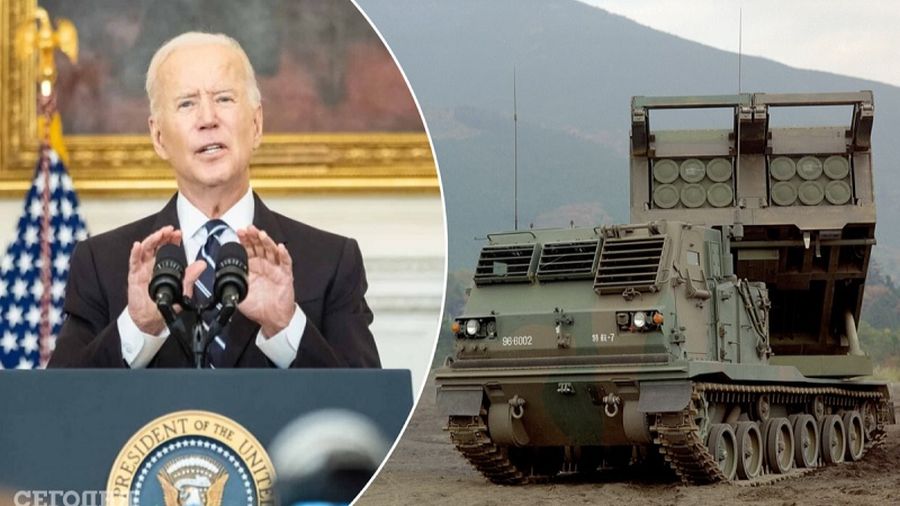Interpreting the US’ Mixed Military Signals Towards Ukraine
Many observers expected that the US would provide long-range missiles to Kiev in order to enable it to strike the Russian heartland, yet US President Biden just surprised everyone by announcing that his administration isn’t considering such shipments. This sudden curveball deserves to be analyzed since it doesn’t conform to the proxy war model upon which most analyses on both sides were built.
The US-led NATO proxy war on Russia through Ukraine has seen Washington already approve $54 billion in multidimensional aid to Kiev, with the direct military component being at least an estimated $24 billion of that. Throughout the nearly 100 days that the Ukrainian Conflict has raged, Kiev even struck Russian border towns on several occasions, though it has yet to obtain the capability to reach deeper into its neighbor’s hinterland. Many observers expected that the US would provide long-range missiles to its proxy in order to do exactly that yet US President Biden just surprised everyone by announcing that his administration isn’t considering such shipments. This sudden curveball deserves to be analyzed since it doesn’t conform to the proxy war model upon which most analyses on both sides were built.
The context leading up to this unexpected decision is that Russia’s slow and steady progress along the Eastern Ukrainian front during the second phase of its ongoing special military operation in Lenin’s unnatural mini-empire appears to be on the brink of achieving a breakthrough as evidenced by the decisive shift in the “official narrative” over the past week. Gone is the so-called “victory porn” of laundering fake news about Kiev’s supposed battlefield successes off as truth and subsequently fantasizing about even taking its imaginary counteroffensive as far as the Russian heartland. Instead, that country’s officials and their US-led Western allies are in a state of shock at their forces’ latest string of losses in the Battle for Donbass, which exposed their prior claims as nothing but information warfare.
These on-the-ground developments are occurring in parallel with Turkey attempting to revive the frozen peace process between Kiev and Moscow, with President Erdogan telling his Russian counterpart on the same day as Biden refused to dispatch long-range missiles to his country’s Eastern European proxy that Istanbul is ready to host a new round of talks and play some sort of role in a vague “observation mechanism” connected to resolving the conflict. President Putin also confirmed during that time that Russia can resume agricultural exports if sanctions are lifted and thus help resolve the global food crisis that his country’s Ambassador to the UN recently argued was artificially manufactured by the US-led West.
Keeping in mind that Foreign Minister Lavrov reaffirmed a day prior that liberating Donbass is an “unconditional priority” of his country’s special military operation and that this outcome already appears to be a fait accompli, the sequence of events suggests that Biden’s pragmatic decision to not dispatch long-range missiles to Kiev that could be employed to strike deep into Russia might be meant to encourage Moscow to seriously consider a Turkish-brokered ceasefire upon its expected victory in the Battle for Donbass. That could then help mitigate the consequences of the US-led West’s artificially manufactured global food crisis as well as prevent Kiev’s completely foreign-supplied forces from being destroyed if the Russian Armed Forces (RAF) dash to the Dnieper following a breakthrough in Donbass.
To be absolutely clear, nothing is being implied about how receptive the Kremlin might be to this scenario, simply that Biden’s unexpectedly pragmatic decision not to escalate tensions by providing Kiev with the means to strike deep into the Russian heartland appears to hint at a desire to freeze the conflict upon Donbass’ impending liberation. That of course doesn’t mean that Moscow will agree to this, but just that President Erdogan’s coincidental diplomatic intervention on the exact same day as Biden’s announcement strongly suggests that a ceasefire plan of some sort is being formulated, one which President Putin seems to be at the very least mildly entertaining as evidenced by him telling his counterpart that the lifting of sanctions could resolve the global food crisis.
Just like the so-called “Battle for Kiev” was in hindsight nothing but a feint by Russia to distract its adversaries from the advances that its armed forces were making elsewhere, so too might President Putin’s possible interest in a ceasefire plan be the same, at least at this moment in time. No observer can say with supreme confidence what he’ll ultimately do, just what they think he should do and why from the perspective of how they understand his country’s interests to be. There’s no doubt that the Kremlin took notice of Biden’s pragmatic refusal to dispatch long-range missiles to Kiev since Deputy Chairman of the Security Council and former President Medvedev lauded it as “reasonable”, so it’s clear that the Russian leadership approves of this development.
For what it’s worth, observers should also take note of the literal meltdown in pro-Kiev social media circles, especially among key influences like former US Ambassador to Russia McFaul. He tweeted that it was a “mistake” four times here, here, here, and here in the span of a single hour and even mocked Biden – whose praises he lavishly sung up until this point after hyping everyone up to expect that he’d deliver the long-range missiles that Kiev demanded – by snarking that “If Medvedev, who has said some absolutely crazy imperial statements lately, is praising your policy decision, you are doing something wrong.” The comments section under his tweets is an amusing example of people denying reality, coping with an unexpected development by concocting conspiracy theories, and pouting.
Although the above is an unscientific example, it nevertheless suggests that Kiev’s side felt like the rug was swept out from underneath them and is now freaking out over the potential political implications of Biden’s unexpectedly pragmatic decision. Most won’t say it directly, but they fear that some kind of ceasefire deal might truly be afoot, one which could freeze the conflict along the line of control following Russia’s impending victory in the Battle of Donbass whereby Moscow retains control of reunified Crimea, the newly recognized Donbass Republics, and Ukraine’s former Kherson and Zaporozhye Regions. That scenario is possible in theory since it would relieve pressure upon all conflicting parties, including indirect ones like the US-led West, and help resolve the global food crisis.
Having said that, observers should recall the top four aims of Russia’s special operation: fully liberate Donbass in order to stop Kiev’s genocide of the indigenous Russian people there; demilitarize Ukraine; denazify it; and ensure this former Soviet Republic’s military neutrality. The first objective is about to be completed; the second was partially accomplished upon Kiev acknowledging Russia’s total destruction of its military-industrial complex in late March; the third was also partially fulfilled by liberating Mariupol and destroying the Neo-Nazi Azov Battalion in its home city; while the last goal remains uncertain but could possibly see some progress if the US-led West dangles the promise of reconstruction aid before Kiev in order to compel it into reforming its constitution to this end.
Realizing that the first objective is about to be achieved while the last one could in theory be fulfilled as part of the peace process, the devil remains in the details when it comes to the second and third ones regarding Kiev’s demilitarization and denazification. Technically, Kiev is nowadays completely dependent on foreign equipment that could in principle be withdrawn in whole or in large part throughout the course of the peace process, which when coupled with the destruction of that former Soviet Republic’s military-industrial complex, means that this goal could prospectively be achieved step by step. As for the denazification objective, this could also in theory be part of the peace process with respect to Kiev reversing discriminatory legislation against Russians and cleansing its textbooks of fascist revisionism.
Once again, readers shouldn’t fall under the false impression of imagining that this analysis is advocating for this scenario or implying that it’s about to happen, just that it appears to be a credible scenario in light of the sequence of events leading up to Biden’s unexpectedly pragmatic announcement that coincidentally occurred on the same day as President Erdogan attempting to revive the frozen peace talks between Moscow and Kiev. No matter how enticing any ceasefire plan might be, it’s ultimately up to the two most directly conflicting parties to agree to it, without which even the seemingly best proposal will simply flounder. Kiev can likely be pressured by the US-led West to do Washington’s bidding no matter what, which means that Moscow holds all the cards when it comes to this scenario.







